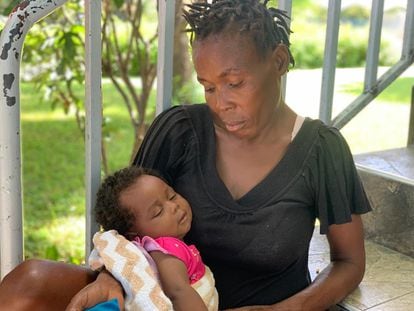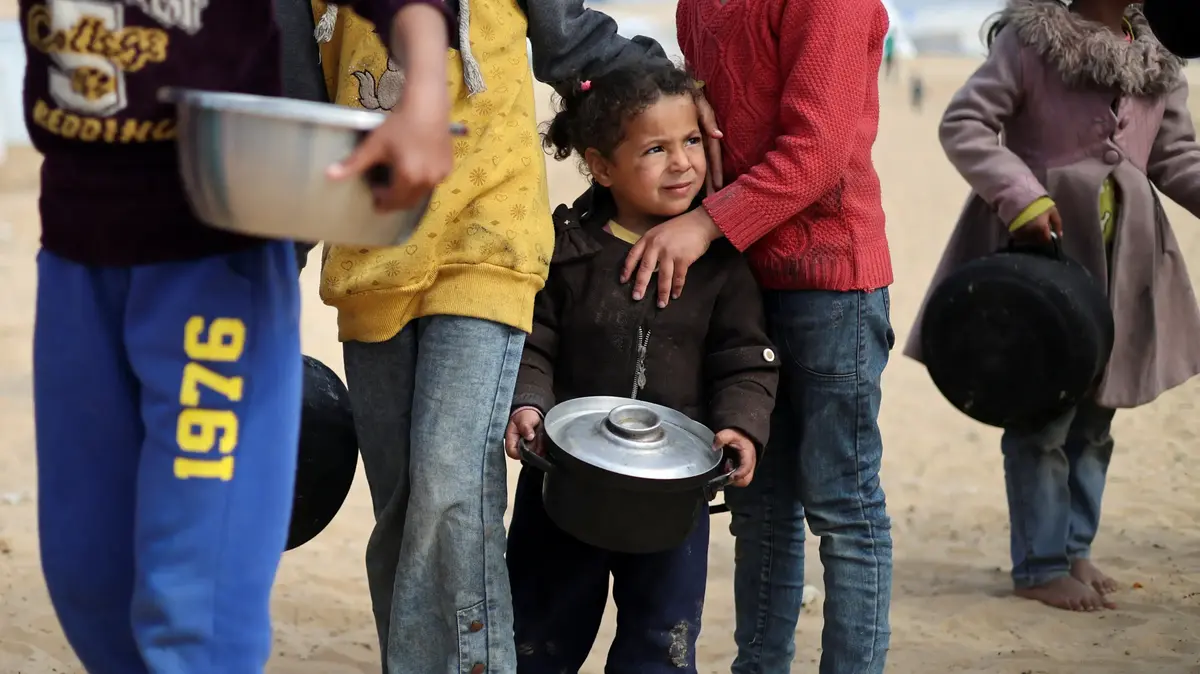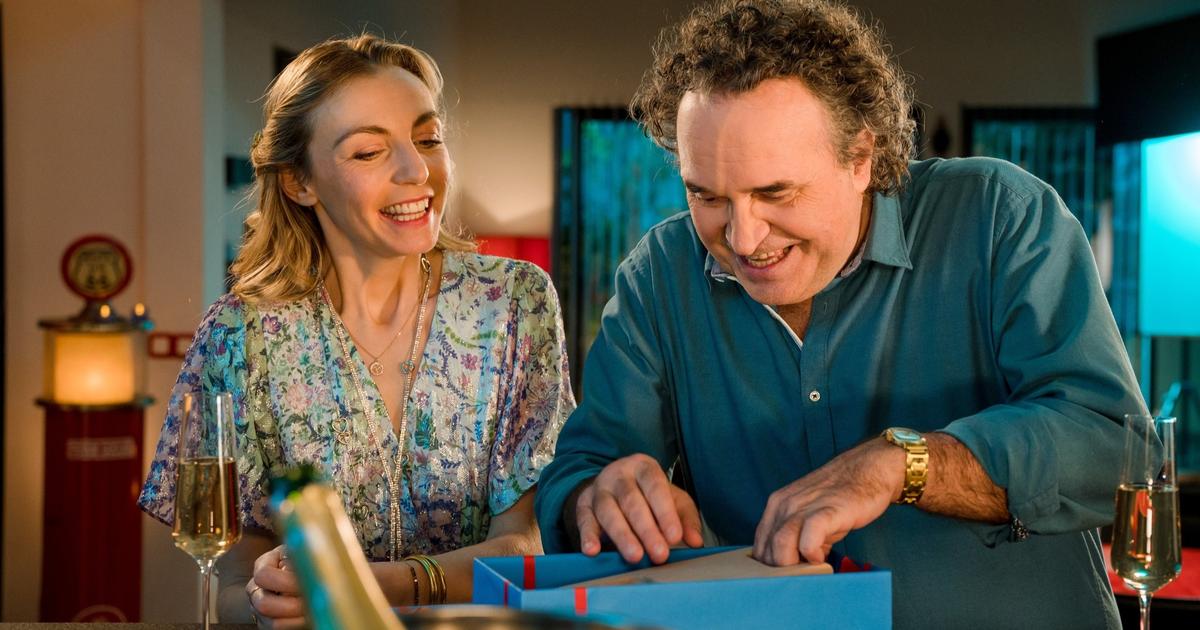Luc Silvina feeds his four-month-old son Djenelson Dumersvier in a temporary shelter after fleeing the Cité Soleil neighborhood in Port-au-Prince. Gessika Thomas (UNICEF)
Luc Silvina and her ten children were born in Cité Soleil (the poorest neighborhood in Port-au-Prince, the capital of Haiti), but she does not want any of them to die there.
Two weeks ago, she already did it to her husband at the hands of a gang.
"They killed him to steal him and then they burned him," says Silvina with the hint of a tear, while she breastfeeds the last of her progeny, a four-month-old boy.
The oldest is already 24 and she is barely 40. She works for charity to achieve the only possible aspiration: to survive.
"I wash dishes and receive the leftovers that they give me in restaurants to eat," explains the woman, who had to flee undercover from Cité Soleil with two of her little ones, faced with the scourge of the armed groups.
"The gangs closely monitor the entrance and exit of the neighborhood," she explains with resignation.
Last month, violence between gangs left 471 dead in the neighborhood in just one week, including the father of Silvina's children.
The scourge of barbarism has hindered the population's access to basic health, nutrition and water services.
One in five children suffers from malnutrition and one in 20 is already in danger of dying for the same reason, according to the latest Unicef alert.
Like Silvina's family, some 3,000 people have had to flee their homes in Cité Soleil, including hundreds of unaccompanied minors, and at least 140 houses have been destroyed or burned, according to the United Nations.
"I just want to have a place to be safe with my children," Silvina cries out with boredom in her voice during a video call interview with this newspaper.
For now, with the support of Unicef, the woman is waiting in the facilities of a school that serves as a temporary shelter together with her two minor children.
Of the ten that she has, three have been adopted, and the remaining five are being helped in other refuge centers.
An evaluation carried out by Unicef in Cité Soleil last April set off alarms.
The margin of malnutrition of minors reached 20% and exceeded the emergency threshold established by the World Health Organization by five percentage points.
9,506 children have been screened for acute malnutrition and 1,918 have received treatment.
In addition, the resurgence of disputes over territory between armed groups has also blocked access to education.
"Some 1,700 schools have closed, which translates into more than 5,000 students out of the classroom," says Dorica Tazuzgika, head of UNICEF's emergency department in Haiti.
The organization, says Tazuzgika, has launched an educational radio project to deal with this reality.
One of the big problems in the neighborhood is shootings.
We can't go out and the kids can't eat
Since July 20, nearly one million liters of drinking water have been delivered to meet the urgent needs of 15,000 people every day, as well as 500 hygiene kits.
It has also set up two mobile health clinics in the Bois Neuf and Belekou neighborhoods of Cité Soleil to provide medical and nutritional care to more than 500 people, mostly women and children.
Unicef helps lactating women and babies through the delivery of food supplements and essential medicines.
Silvina receives doses of therapeutic milk and vitamin supplements to ensure that her two little ones stay alive.
The World Food Program has warned that more than four and a half million people face the worst levels of food insecurity in the country.
The organization has refrained from offering statements to Planeta Futuro about its operations in Cité Soleil, due to the difficult security context in the area.
In some areas, Doctors Without Borders treats patients in basements or rooms without windows, due to the danger of crossfire.
Access to health services has been drastically reduced: only 4% of the population uses public health centers and 64% is attended by non-governmental organizations such as Doctors Without Borders (MSF).
Benoît Vasseur, general coordinator of MSF in Haiti, stresses that the armed struggle has incessantly intensified the work in the area.
“Our team treated 80 people with gunshot wounds in just three days.
Infected gunshot wounds, malnutrition and trauma care have been the focus of the emergency,” says Vasseur, who also highlights an increase in cases of sexual violence.
In some areas, MSF can only treat patients in basements or rooms without windows, due to the danger of crossfire, the organization revealed in a statement.
Last month,
MSF surgeon Federica Lezzi shared the story of a girl from Cité Soleil who survived a stray bullet.
She was barely seven years old.
Since the assassination of President Jovenel Moïse in July 2021, violence in Port-au-Prince has escalated to unsustainable levels.
So far this year, there have been 934 murders, 684 injuries and 680 kidnappings in the capital, according to a recent UN report.
The barbarity has hindered humanitarian work in various parts of the city.
"We have access difficulties in Martissant, La Saline and Croix de Bouquet, where our entry is intermittent," admits Tazuzgika, from Unicef.
In addition to armed violence, the crisis is fueled by the rise in food prices, which responds to inflation that has already reached 29%, according to data from the Haitian Institute of Statistics.
Entire families like Silvina's permanently require humanitarian attention.
"To ignore this reality is to be complicit in the world's contempt for Haiti's anguish," concluded an editorial published five days ago in the
Washington Post
, which made a strong appeal to the international community to respond together, and effectively, to the difficult situation in the country.
Both Tazuzgika (UNICEF) and Vasseur (MSF), who have faced humanitarian crises in other countries in Africa and Asia, agree that the situation is getting worse.
"Haiti is constantly on the brink of a new emergency," Tezuzgika points out.
“The outlook is very cloudy.
So far, we haven't seen any kind of improvement,” agrees Vassseur.
Silvina, for her part, just wants to be far away, and start from scratch: "outside of Haiti I would go anywhere."
You can follow PLANETA FUTURO on
,
and
, and subscribe
to our 'newsletter'
here
.











/cloudfront-eu-central-1.images.arcpublishing.com/prisa/KMEYMJKESBAZBE4MRBAM4TGHIQ.jpg)


